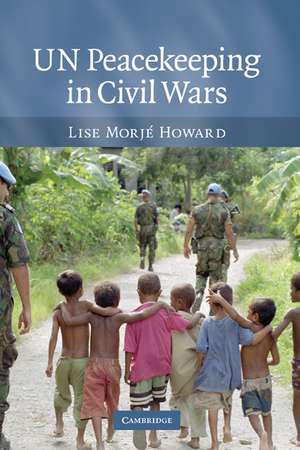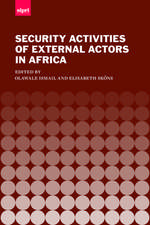UN Peacekeeping in Civil Wars
Autor Lise Morjé Howarden Limba Engleză Hardback – 28 noi 2007
| Toate formatele și edițiile | Preț | Express |
|---|---|---|
| Paperback (1) | 277.76 lei 6-8 săpt. | |
| Cambridge University Press – 28 noi 2007 | 277.76 lei 6-8 săpt. | |
| Hardback (1) | 594.02 lei 6-8 săpt. | |
| Cambridge University Press – 28 noi 2007 | 594.02 lei 6-8 săpt. |
Preț: 594.02 lei
Preț vechi: 652.76 lei
-9% Nou
Puncte Express: 891
Preț estimativ în valută:
113.68€ • 118.25$ • 93.85£
113.68€ • 118.25$ • 93.85£
Carte tipărită la comandă
Livrare economică 15-29 aprilie
Preluare comenzi: 021 569.72.76
Specificații
ISBN-13: 9780521881388
ISBN-10: 0521881382
Pagini: 418
Ilustrații: 2 tables
Dimensiuni: 152 x 229 x 27 mm
Greutate: 0.66 kg
Ediția:1
Editura: Cambridge University Press
Colecția Cambridge University Press
Locul publicării:Cambridge, United Kingdom
ISBN-10: 0521881382
Pagini: 418
Ilustrații: 2 tables
Dimensiuni: 152 x 229 x 27 mm
Greutate: 0.66 kg
Ediția:1
Editura: Cambridge University Press
Colecția Cambridge University Press
Locul publicării:Cambridge, United Kingdom
Cuprins
1. Introduction; 2. The failures: Somalia, Rwanda, Angola, Bosnia; 3. Namibia: the first major success; 4. El Salvador: centrally-propelled learning; 5. Cambodia: organizational dysfunction, partial learning and mixed success; 6. Mozambique: learning to create consent; 7. Eastern Slavonia: institution-building and the limited use of force; 8. East Timor: the UN as state; 9. The ongoing multidimensional operations; 10. Conclusion: two levels of organizational learning.
Recenzii
'Dr Howard's well researched book is important reading for all those who want to know how peacekeeping operations should be run and how they could be further improved.' Martti Ahtisaari, Winner 2008 Nobel Peace Prize, Former President of Finland (1994–2000), and United Nations Special Envoy for the future status process for Kosovo
'This is a terrific book: ambitious, important, theoretically sophisticated, meticulously researched and beautifully written. Examining ten cases of UN peacekeeping in civil wars, Howard identifies both the necessary and the sufficient conditions for success in these efforts. This book will have a long shelf-life.' George W. Breslauer, University of California, Berkeley
'What makes for successful multidimensional peacekeeping missions? Howard argues that organizational learning in the UN mission itself is an overlooked but crucial variable. She examines other determinants of success as well, including domestic conditions within the war-torn country, and the alignment of interests within the Security Council. Drawing on carefully constructed case studies, she provides rigorous analysis of all of these factors, but it is the emphasis on the ways in which a peacekeeping mission adapts and learns (or fails to do so) that makes for a truly original and important contribution to our understanding of this timely topic. This book should be required reading for both students and practitioners of peacekeeping.' Page Fortna, Columbia University
'A superb systematic examination of how different types of organizational learning contributed to peacekeeping successes and how organizational dysfunction and the absence of sustained learning can hamper UN peacekeeping operations. This is not just another book on the difficulties of post-Cold War UN peacekeeping in complex conflicts and is a must-read for practitioners and scholars alike.' Margaret P. Karns, University of Dayton
'Because civil war persists in today's troubled world, Lise Howard's dissection of why and how UN peacekeeping missions have succeeded or failed in strengthening local and world peace is essential reading for practitioners and scholars. Her insights should inform the mandates given to future peacekeeping missions, and their composition.' Robert Rotberg, Harvard University
'Lise Morjé Howard has written an important and stimulating text on the UN and peacekeeping which leaves a lasting impression …' International Peacekeeping
'… a helpful synthesis that connects first- and second-level learning, and places it within recent trends influencing peacekeeping. … exceptional insight into past errors and methods for correcting shortcomings.' Dynamics of Asymmetric Conflict
'Her endeavor offers invaluable insights into understanding the dynamics that facilitated the institutionalization of peacemaking as the appropriate policy response to civil conflicts. It should be mentioned at the outset that it is a rare pleasure to come across a volume with the investigative breadth and theoretical scope as the one written by Howard. … an inspiring mapping of the politics, policy, and practices of peacekeeping. … Such a valuable contribution to the study of peacekeeping will benefit both the student and practitioner of international relations. Howard's ability to gather such a wide range of perspectives and experience makes her effort worthwhile, and the volume will therefore be very useful to anyone dealing with or keen to learn about the complex dynamics of peacekeeping.' H-Net Reviews
'… a welcome remedy to the over-abundance of relatively poor work on peacekeeping. … this book offers a coherent, readable and disciplined examination of recent UN peacekeeping. … a useful study that should be widely read …' International Studies Review
'In this impressive work of scholarship, Lise Morjé Howard subjects UN peacekeeping in civil wars to critical and rigorous scrutiny … this is a first-rate book that deserves wide readership in policy, university, and informed public circles.' Perspectives on Politics
'This is a terrific book: ambitious, important, theoretically sophisticated, meticulously researched and beautifully written. Examining ten cases of UN peacekeeping in civil wars, Howard identifies both the necessary and the sufficient conditions for success in these efforts. This book will have a long shelf-life.' George W. Breslauer, University of California, Berkeley
'What makes for successful multidimensional peacekeeping missions? Howard argues that organizational learning in the UN mission itself is an overlooked but crucial variable. She examines other determinants of success as well, including domestic conditions within the war-torn country, and the alignment of interests within the Security Council. Drawing on carefully constructed case studies, she provides rigorous analysis of all of these factors, but it is the emphasis on the ways in which a peacekeeping mission adapts and learns (or fails to do so) that makes for a truly original and important contribution to our understanding of this timely topic. This book should be required reading for both students and practitioners of peacekeeping.' Page Fortna, Columbia University
'A superb systematic examination of how different types of organizational learning contributed to peacekeeping successes and how organizational dysfunction and the absence of sustained learning can hamper UN peacekeeping operations. This is not just another book on the difficulties of post-Cold War UN peacekeeping in complex conflicts and is a must-read for practitioners and scholars alike.' Margaret P. Karns, University of Dayton
'Because civil war persists in today's troubled world, Lise Howard's dissection of why and how UN peacekeeping missions have succeeded or failed in strengthening local and world peace is essential reading for practitioners and scholars. Her insights should inform the mandates given to future peacekeeping missions, and their composition.' Robert Rotberg, Harvard University
'Lise Morjé Howard has written an important and stimulating text on the UN and peacekeeping which leaves a lasting impression …' International Peacekeeping
'… a helpful synthesis that connects first- and second-level learning, and places it within recent trends influencing peacekeeping. … exceptional insight into past errors and methods for correcting shortcomings.' Dynamics of Asymmetric Conflict
'Her endeavor offers invaluable insights into understanding the dynamics that facilitated the institutionalization of peacemaking as the appropriate policy response to civil conflicts. It should be mentioned at the outset that it is a rare pleasure to come across a volume with the investigative breadth and theoretical scope as the one written by Howard. … an inspiring mapping of the politics, policy, and practices of peacekeeping. … Such a valuable contribution to the study of peacekeeping will benefit both the student and practitioner of international relations. Howard's ability to gather such a wide range of perspectives and experience makes her effort worthwhile, and the volume will therefore be very useful to anyone dealing with or keen to learn about the complex dynamics of peacekeeping.' H-Net Reviews
'… a welcome remedy to the over-abundance of relatively poor work on peacekeeping. … this book offers a coherent, readable and disciplined examination of recent UN peacekeeping. … a useful study that should be widely read …' International Studies Review
'In this impressive work of scholarship, Lise Morjé Howard subjects UN peacekeeping in civil wars to critical and rigorous scrutiny … this is a first-rate book that deserves wide readership in policy, university, and informed public circles.' Perspectives on Politics
Notă biografică
Descriere
An in-depth 2007 analysis of the sources of success and failure in UN peacekeeping missions in civil wars.











